
The Electric Light Orchestra (ELO) are an English rock band formed in Birmingham in 1970 by songwriters and multi-instrumentalists Jeff Lynne and Roy Wood with drummer Bev Bevan. Their music is characterised by a fusion of Beatlesque pop, classical arrangements and futuristic iconography. After Wood's departure in 1972, Lynne became the band's sole leader, arranging and producing every album while writing nearly all of their original material. For their initial tenure, Lynne, Bevan and keyboardist Richard Tandy were the group's only consistent members.

Face the Music is the fifth studio album by Electric Light Orchestra (ELO). It was released in September 1975 by United Artists Records and on 14 November 1975 in the United Kingdom by Jet Records. The album moves away from the large-scale classical orchestrated sound from the previous album, Eldorado, in favor of more "radio-friendly" pop/rock songs, though the string sections are still very prominent. The new sound proved successful for the group as Face the Music was the first ELO album to go platinum.

On the Third Day is the third studio album by Electric Light Orchestra (ELO), and the first to be recorded without input from Roy Wood. It was released in the United States in November 1973 by United Artists Records, and in the United Kingdom on 14 December 1973 by Warner Bros. Records. From this album on, the word The was dropped from the band's name. The album was reissued on 12 September 2006.

ELO 2 is the second studio album by the Electric Light Orchestra (ELO), released in 1973. In the US, the album was released as Electric Light Orchestra II. It was also the band's last album to be released by the Harvest label, the last on which the band used the definite article The in their name, and the one that introduced their abbreviated name 'ELO'.

A New World Record is the sixth studio album by Electric Light Orchestra (ELO). It was released in September 1976 on United Artists Records in the U.S., and on 19 November 1976 on Jet Records in the United Kingdom. A New World Record marked ELO's shift towards shorter pop songs, a trend which would continue across their career.

Richard Tandy is an English musician. He is best known as the keyboardist in the rock band Electric Light Orchestra ("ELO"). His palette of keyboards was an important ingredient in the group's sound, especially on the albums A New World Record, Out of the Blue, Discovery, and Time.

"Strange Magic" is a song written and performed by the Electric Light Orchestra (ELO). It was released on their 1975 Face the Music album.
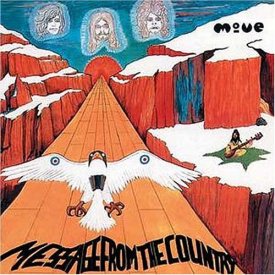
Message from the Country is the fourth and final studio album by the Move, as well as the group's only album for EMI's Harvest label. It was recorded simultaneously with the first Electric Light Orchestra album, Electric Light Orchestra. A contractual obligation, it was to signal the end of The Move and allow them to continue as the Electric Light Orchestra.

"Mr. Blue Sky" is a song by the Electric Light Orchestra (ELO), featured on the band's seventh studio album Out of the Blue (1977). Written and produced by frontman Jeff Lynne, the song forms the fourth and final track of the "Concerto for a Rainy Day" suite, on side three of the original double album. "Mr. Blue Sky" was the second single to be taken from Out of the Blue, peaking at number 6 in the UK Singles Chart and number 35 in the US Billboard Charts.
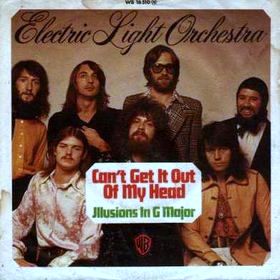
"Can't Get It Out of My Head" is a song written by Jeff Lynne and originally recorded by Electric Light Orchestra.
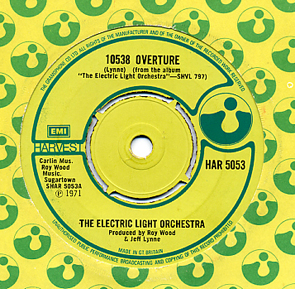
"10538 Overture" is the debut single by Electric Light Orchestra (ELO), released in 1972.

"Rockaria!" is a song by Electric Light Orchestra (ELO), written by Jeff Lynne. It was the third track on the band's successful 1976 album A New World Record, and was the second single from the album. On some CD pressings of A New World Record, the title appears without the exclamation mark.

"Do Ya" is a song written by Jeff Lynne, that was originally recorded by The Move, which became a hit for the Electric Light Orchestra in 1977.

"Ma-Ma-Ma Belle" is a song recorded by the Electric Light Orchestra (ELO).

"Showdown" is a 1973 song written by Jeff Lynne and recorded by the Electric Light Orchestra (ELO). It was the band's last contemporary recording to be released on the Harvest label. It was released as a single and reached No 12 in the UK Singles Chart, in the week beginning 28 October, and No 9 on the Norwegian chart VG-lista.

"Evil Woman" is a song written by lead vocalist Jeff Lynne and recorded by Electric Light Orchestra (ELO). It was first released on the band's fifth album, 1975's Face the Music.
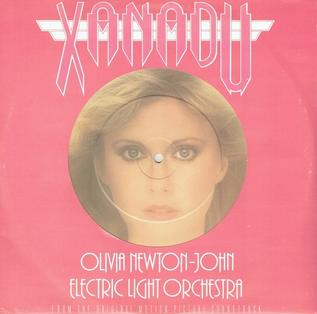
"Xanadu" is the title song from the soundtrack of the 1980 film Xanadu. Written by Jeff Lynne of the English rock band Electric Light Orchestra (ELO), the song is performed by English-born Australian singer Olivia Newton-John, with Lynne adding parenthetic vocals in the style of his other songs on the Xanadu soundtrack, and ELO providing the instrumentation. It is Lynne's favourite song of the ones he has written.

"Don't Walk Away" is a song by the Electric Light Orchestra (ELO).

Below is the complete Electric Light Orchestra (ELO) discography including imports, videos, and hit singles. ELO's back catalogue is unusual since their compilation albums far outweigh their studio output in number, owing to the large number of hit singles primarily written by Jeff Lynne.
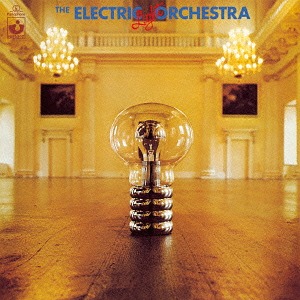
The Electric Light Orchestra is the eponymous debut studio album by English rock band Electric Light Orchestra (ELO), released in December 1971 in the United Kingdom by Harvest Records. In the United States, the album was released in March 1972 as No Answer, after a misunderstood telephone message made by a United Artists Records executive asking about the album name; the caller, having failed to reach the ELO contact, wrote down "no answer" in his notes, and this was misconstrued to be the name of the album.


















